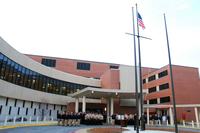
The Air Force has been tracking aggressive cyber incursions by computer technicians in China, primarily focused toward gathering information on military network infrastructure and American trade secrets, the Air Force's cyber warfare commander said this week.
"China has put a lot of resources into this business," said Lt. Gen. Robert Elder, commander of Air Force Cyberspace Command. "China, at this point, is not interested so much in attack as they are in using the Internet to pull [industrial] data."
"They're interested in doing this in a way that they can be dominant without even having a fight," he added.
A recently-released Pentagon report on Chinese military development said Beijing is crafting an aggressive computer network operations strategy that the People's Liberation Army "sees as critical to achieving 'electromagnetic dominance' early in a conflict."
While his newly-established command is focused primarily on the defense of military information networks, communications nodes and command and control systems by "peer competitors" such as China, Russia and Iran, Elder told reporters during a June 13 breakfast meeting in Washington his cyber warriors don't see much of a threat from terrorist-initiated attacks.
"If you have a terrorist operating on their own they're going to have less capability than if they had nation-state sponsorship," Elder explained. "To seriously disrupt us, you're not going to be able to do this with a 'teenage hacker' capability."
Aside from the defense of Air Force cyberspace from would-be attackers, Elder said his command is focused on developing tactics to render adversaries' computer systems inoperable, dropping cyber bombs on enemy sensors, databases and battle management systems.
"Everything I talk about we're trying to do to an adversary we're trying to defend for ourselves," Elder said.
"We want to go in and knock them out in the first round," he added.
The Air Force formally established Cyberspace Command in November after the Pentagon-crafted Quadrennial Defense Review designated cyberspace as an emerging battlefield where American forces increasingly will have to fight in the future.
The vulnerability of networks and the disruption computer hackers can cause to a country's infrastructure was demonstrated in early May after cyber attacks on a wide range of civilian and government networks in Estonia crippled state-run banks, telecommunications companies and news organizations for weeks.
Estonian government officials allege the attacks were launched from state-owned networks in Russia, though the Kremlin denies they had anything to do with the computer assault. But the accusation raises questions about how Elder's command should respond to similar attacks against Air Force cyber infrastructure.
The service is working to develop doctrine on how to defend - and counter-attack - cyber adversaries who can potentially shield their identities or seek cover in networks that have no knowledge of the attack.
"We are looking to provide very precise effects - you want to minimize collateral damage," Elder said. "Would a civilian target be a legitimate target? Generally ... you don't go after civilian targets."
The Air Force has instituted security procedures to ensure individual workstations can't serve as gateways for an adversary into military networks, an effort Elder hopes will prompt Airmen to "recognize that this is not a safe neighborhood."
The Cyberspace Command has already begun to build its cadre of cyber warriors, drawing upon the nearly 45,000 Airmen already tasked with information technology-related duties in the service.
Air Force instructors will keep an eye out during initial training for potential cyber warriors to fill out the ranks, and Elder intends to establish a viable career path for his Airmen in hopes of keeping Cyberspace Command strong in the future.
"We're trying to get someone trained who can work on a production line who's an expert on doing their part, and over time you expand that," Elder said. "It's going to be really critical for us to be able to retain these people into continuing in the force."
-- Christian







